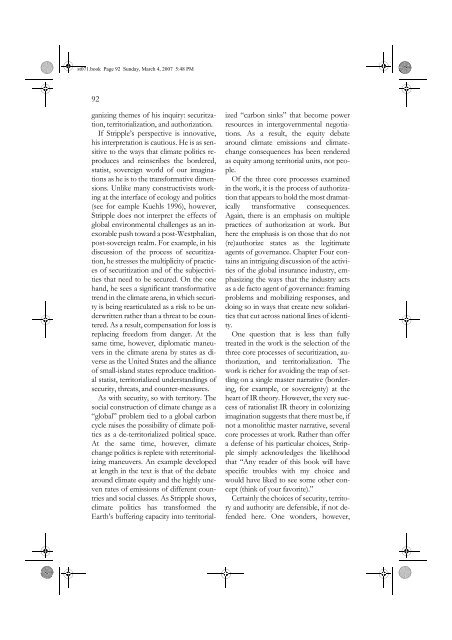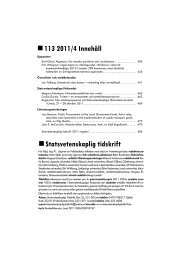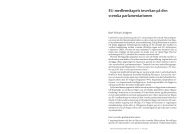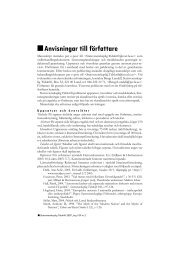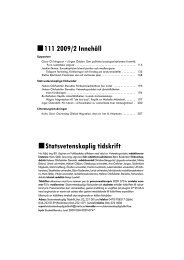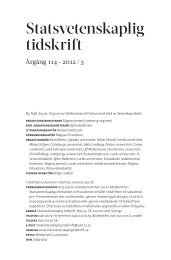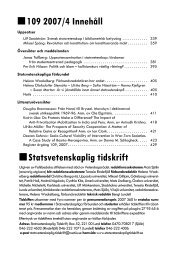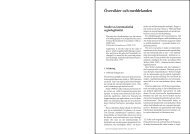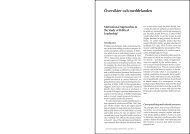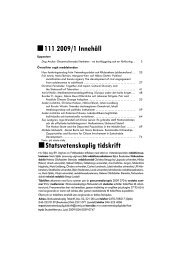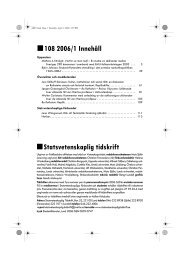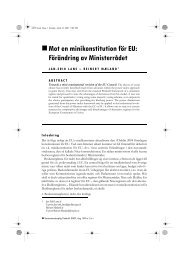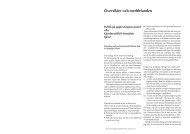Hela nummer 2007/1 (PDF, 2047 kb) - Statsvetenskaplig tidskrift
Hela nummer 2007/1 (PDF, 2047 kb) - Statsvetenskaplig tidskrift
Hela nummer 2007/1 (PDF, 2047 kb) - Statsvetenskaplig tidskrift
Create successful ePaper yourself
Turn your PDF publications into a flip-book with our unique Google optimized e-Paper software.
st071.book Page 92 Sunday, March 4, <strong>2007</strong> 5:48 PM<br />
92<br />
ganizing themes of his inquiry: securitzation,<br />
territorialization, and authorization.<br />
If Stripple’s perspective is innovative,<br />
his interpretation is cautious. He is as sensitive<br />
to the ways that climate politics reproduces<br />
and reinscribes the bordered,<br />
statist, sovereign world of our imaginations<br />
as he is to the transformative dimensions.<br />
Unlike many constructivists working<br />
at the interface of ecology and politics<br />
(see for eample Kuehls 1996), however,<br />
Stripple does not interpret the effects of<br />
global environmental challenges as an inexorable<br />
push toward a post-Westphalian,<br />
post-sovereign realm. For example, in his<br />
discussion of the process of securitization,<br />
he stresses the multiplicity of practices<br />
of securitization and of the subjectivities<br />
that need to be secured. On the one<br />
hand, he sees a significant transformative<br />
trend in the climate arena, in which security<br />
is being rearticulated as a risk to be underwritten<br />
rather than a threat to be countered.<br />
As a result, compensation for loss is<br />
replacing freedom from danger. At the<br />
same time, however, diplomatic maneuvers<br />
in the climate arena by states as diverse<br />
as the United States and the alliance<br />
of small-island states reproduce traditional<br />
statist, territorialized understandings of<br />
security, threats, and counter-measures.<br />
As with security, so with territory. The<br />
social construction of climate change as a<br />
“global” problem tied to a global carbon<br />
cycle raises the possibility of climate politics<br />
as a de-territorialized political space.<br />
At the same time, however, climate<br />
change politics is replete with reterritorializing<br />
maneuvers. An example developed<br />
at length in the text is that of the debate<br />
around climate equity and the highly uneven<br />
rates of emissions of different countries<br />
and social classes. As Stripple shows,<br />
climate politics has transformed the<br />
Earth’s buffering capacity into territorial-<br />
ized “carbon sinks” that become power<br />
resources in intergovernmental negotiations.<br />
As a result, the equity debate<br />
around climate emissions and climatechange<br />
consequences has been rendered<br />
as equity among territorial units, not people.<br />
Of the three core processes examined<br />
in the work, it is the process of authorization<br />
that appears to hold the most dramatically<br />
transformative consequences.<br />
Again, there is an emphasis on multiple<br />
practices of authorization at work. But<br />
here the emphasis is on those that do not<br />
(re)authorize states as the legitimate<br />
agents of governance. Chapter Four contains<br />
an intriguing discussion of the activities<br />
of the global insurance industry, emphasizing<br />
the ways that the industry acts<br />
as a de facto agent of governance: framing<br />
problems and mobilizing responses, and<br />
doing so in ways that create new solidarities<br />
that cut across national lines of identity.<br />
One question that is less than fully<br />
treated in the work is the selection of the<br />
three core processes of securitization, authorization,<br />
and territorialization. The<br />
work is richer for avoiding the trap of settling<br />
on a single master narrative (bordering,<br />
for example, or sovereignty) at the<br />
heart of IR theory. However, the very success<br />
of rationalist IR theory in colonizing<br />
imagination suggests that there must be, if<br />
not a monolithic master narrative, several<br />
core processes at work. Rather than offer<br />
a defense of his particular choices, Stripple<br />
simply acknowledges the likelihood<br />
that “Any reader of this book will have<br />
specific troubles with my choice and<br />
would have liked to see some other concept<br />
(think of your favorite).”<br />
Certainly the choices of security, territory<br />
and authority are defensible, if not defended<br />
here. One wonders, however,


